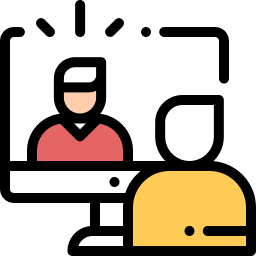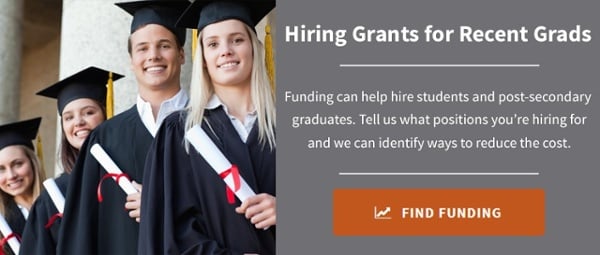How is AI Recruitment Affecting the Hiring Process?

Recruiting is one of the toughest issues organizations face today and finding the right candidate is crucial for business success. It takes a lot of time and money to be confident with a hiring decision, so if that chosen individual ends up not being the right fit for the role, it can be a detrimental setback to the company. Ironically, artificial intelligence (AI) and machine learning has been sweeping throughout the business world to support the traditional recruitment process and solve problems of human capital management.
While some might be worried that all this technology will hinder the human interaction aspect of the recruitment process, if integrated properly, it can reap benefits.
Given that traditional recruiting measures can be a notorious undertaking, AI can enhance the process and help improve talent acquisition efficiency and effectiveness. It can allow Human Resource managers more time to focus on hiring the right person for the job without the backend manual work. Consider some of the ways AI is affecting the recruitment process.
Ways Artificial Intelligence is Integrating into Recruitment Practices
Some of the most central aspects of the hiring process are to source talent, effectively communicate with candidates, and build a relationship with potential hires. Incorporating artificial intelligence into the recruiting process can help support these values and offer benefits for both the recruiter and the candidate.
In a survey carried out by Entelo, 72% of respondents agreed that automated sourcing would increase their productivity.
It’s important to remember that AI recruitment is available to be a support mechanism. AI allows more time to be spent on the necessary human interaction aspect of recruiting by supporting the hiring process in five key areas:
Hire More Targeted Candidates
 With AI recruitment, talent acquisition specialists are now able to target, screen, and source more highly qualified candidates. AI can let them target searches by criteria such as age, industry, location, job title, education, household income, salary, and spending habits – for example, by displaying job ads to people with the right profile and interest level (instead of the casual “wide net” approach) and implementing AI to scan and screen existing talent databases, saving time.
With AI recruitment, talent acquisition specialists are now able to target, screen, and source more highly qualified candidates. AI can let them target searches by criteria such as age, industry, location, job title, education, household income, salary, and spending habits – for example, by displaying job ads to people with the right profile and interest level (instead of the casual “wide net” approach) and implementing AI to scan and screen existing talent databases, saving time.
Eliminate Hiring Bias
 Although it would be ideal to hire someone based only on their ability to do the job well, because everyone is human, there are times where outside factors shield judgment and unconscious decisions are made. The implementation of AI in the recruitment process can help eliminate hiring that is based solely on a resume and intuition. It’s important to note that not all technology is an end-all solution so it’s best to combine the data with your judgment later in the process.
Although it would be ideal to hire someone based only on their ability to do the job well, because everyone is human, there are times where outside factors shield judgment and unconscious decisions are made. The implementation of AI in the recruitment process can help eliminate hiring that is based solely on a resume and intuition. It’s important to note that not all technology is an end-all solution so it’s best to combine the data with your judgment later in the process.
Video Interviewing
 There are video interviewing solutions available to read semantics, body language, and grammar and speech patterns which can help reveal a plethora of undeclared information about a candidate. This automated approach is better suited for optimizing high-volume hiring cycles. Video interviewing also speeds up the process for candidates so that they don’t have to worry about the logistics of getting to an office on time. It’s important to be cautious with this approach as video interviewing in general can be intimidating for candidates.
There are video interviewing solutions available to read semantics, body language, and grammar and speech patterns which can help reveal a plethora of undeclared information about a candidate. This automated approach is better suited for optimizing high-volume hiring cycles. Video interviewing also speeds up the process for candidates so that they don’t have to worry about the logistics of getting to an office on time. It’s important to be cautious with this approach as video interviewing in general can be intimidating for candidates.
Time Savings
 There’s no doubt that an AI-enabled recruitment process would save time. On average, between assessing resumes, scheduling interviews, and emailing candidates, talent acquisition specialists spend nearly 13-20 hours a week sourcing candidates for a single role. Tasks accomplished by AI schedulers, chat-bots, and assessment tools don’t require human intervention, and the technology can handle a much larger load of data. Applying artificial intelligence tools improves the experience for candidates by providing them with timely responses to questions or enquiries they might have and reducing their waiting time.
There’s no doubt that an AI-enabled recruitment process would save time. On average, between assessing resumes, scheduling interviews, and emailing candidates, talent acquisition specialists spend nearly 13-20 hours a week sourcing candidates for a single role. Tasks accomplished by AI schedulers, chat-bots, and assessment tools don’t require human intervention, and the technology can handle a much larger load of data. Applying artificial intelligence tools improves the experience for candidates by providing them with timely responses to questions or enquiries they might have and reducing their waiting time.
Manage Candidates’ Timelines
 As mentioned, AI can help speed up the recruiting process and improve the timeliness of communication between candidates and recruiters. Applicants appreciate timely responses; 40% of candidates expect to be asked to interview within a week of submitting an application. Sensible communication with potential candidates speaks volumes about your business and a bad recruitment experience may have a negative effect on people’s perception of your company. One way AI can help with this is to have an auto-reply acknowledgment of each candidate application.
As mentioned, AI can help speed up the recruiting process and improve the timeliness of communication between candidates and recruiters. Applicants appreciate timely responses; 40% of candidates expect to be asked to interview within a week of submitting an application. Sensible communication with potential candidates speaks volumes about your business and a bad recruitment experience may have a negative effect on people’s perception of your company. One way AI can help with this is to have an auto-reply acknowledgment of each candidate application.
In conclusion, recruitment is a two-way street. Candidates want to find the perfect company, and companies want to find the perfect candidates. Integrating AI in the recruitment process has the potential to benefit both parties and help solve challenges – like the time is takes to hire, finding the right hire, and ensuring overall satisfaction for the applicant and the business seeking candidates.
Canadian Government Grants to Develop Your Workforce
Hiring the right employees can help your business reach new heights. Regardless of the scale of your hiring efforts, increasing your workforce can lead to significant benefits to an organization’s profitability. If you are planning on expanding or developing your workforce, there are Canadian government grants for small business recruitment activities to ensure they have qualified workers with the necessary skills and capabilities to support ongoing and future business plans.
A wide range of wage subsidies are available to Canadian businesses, covering a percentage of the new employee’s hourly wage rate or a set hourly subsidy dollar amount. Reach out to Mentor Works via the Wage Subsidy Identifier and we can identify hiring grants available for your business.

